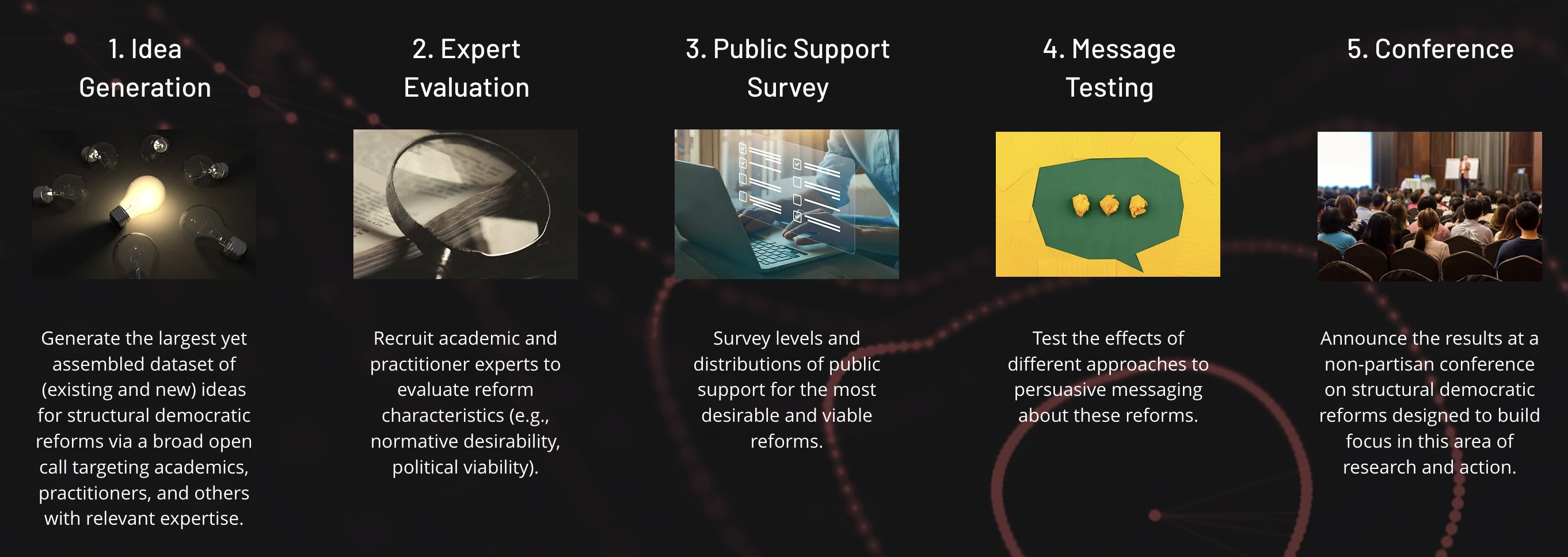Hello EA community! My lab recently launched the Structural Democratic Reforms project, which is using crowdsourcing, expert evaluation, and messaging testing to identify the best democratic reforms to safeguard and strengthen American democracy. We're in the crowdsourcing phase, and we'd love to get folks from the EA community to submit their ideas for democratic reforms!
Here's why I'm especially keen on getting ideas from those in the EA community: Right now, our submitters are disproportionately academic political scientists. By tapping into the EA community, we'll hopefully have a more diverse set of ideas from a more diverse group of thinkers. And because EA folks typically push for the most effective solutions--often with creative or unconventional ideas that others might miss--I thought it would be especially interesting and important crowdsource from this group.
Submissions can be made here and can take under 5 minutes. The deadline for submissions is September 15, 2024. Multiple submissions are welcome!
Why This Matters
A healthy American democracy underlies many EA cause areas--it is potentially important for promoting world peace, AI safety, economic prospretity, technological development, human rights, and more. For a more in depth discussion of why democracy is relevant to EA, you can read 80,000 hours brief cause area overview.
What We're Looking For
We're seeking ideas for structural democratic reforms that could be implemented via federal legislation, state legislation, executive order, or ballot initiative. These reforms should promote one or more of the following democratic principles:
- Increasing citizens' influence on election and policy outcomes
- Facilitating voter participation and ballot access
- Ensuring integrity, transparency, and fairness of election systems
We welcome both established ideas and novel, creative solutions.
Spread the Word
Feel free to share this call for ideas widely! The more diverse perspectives we gather, the better. You can share this EA forum post or retweet our announcement on Twitter.
What Happens Next
After the submission period, an expert panel will evaluate these reforms on several dimensions (e.g., normative desirability, political viability). The most promising ideas will be further researched and potentially tested for public support and effective messaging strategies. See the project plan below.

We're Grateful for Your Input!
Your participation will make this project stronger! Every submission matters--conventional ideas point towards potential consensus, and unconventional ideas may illuminate hidden gems. More ideas (and more diverse ideas) will also give us confidence that we did our best at exhausting the ideas space. We're truly thankful for anyone who participates and/or spreads the word!
Finally, if you have feedback for the project, feel free to comment on the post or send us an email at democratic-reforms@stanford.edu.

Sorry if I am being unfair, but itseems to me a bit naïve to base all of your Structural Democratic Reforms project solely on election theory, and ignore other institutions that are extremely impactful, but more neglected by and less accountable to the wide public, such as Supreme Courts, Central Banks and regulatory authorities (and even Audit Institutions).
Before the Hamas's attack, Israel was in political turmoil because a sort of constitutional crisis between its Supreme Court and the government regarding the 2023 Israeli judicial reform. Current US Supreme Court not only struck Roe v. Wade this year, but it also decided that, while the Head of the Executive is immune against prosecution for any official act (Trump v. U.S.), regulatory authorities (that ultimately respond to the President) have no power to issue binding interpretations of statutory law (Loper Bright Enterprises et al.), thus ending four decades of the Chevron deference doctrine. Now consider that Supreme Courts allegedly have a longevity problem - they used to serve for an average 17 years, and are now predicted to serve for 35 years. Other jurisdictions face similar issues (e.g.: Brazilian judiciary has had a tremendous political impact in the last 10 years, and now legislators want to restrict Supreme Court judges powers).
An obvious fix would be adopting term limits, but, though I am a passionate defender of judicial review, I think that centralizing so much power on such a small body is a mechanism design nightmare.
And Central Banks face political scrutiny everywhere; yet, while Open Philanthropy did fund research on macroeconomics and there's a consensus that monetary authorities must be insulated from the Executive, I am unaware of anyone in EA-space currently doing research on Central Bank politics (though, here, I would say it's probably not a neglected topic - it's just that the public tends to ignore it, and maybe crypto-friendly EAs just despise central bankers).